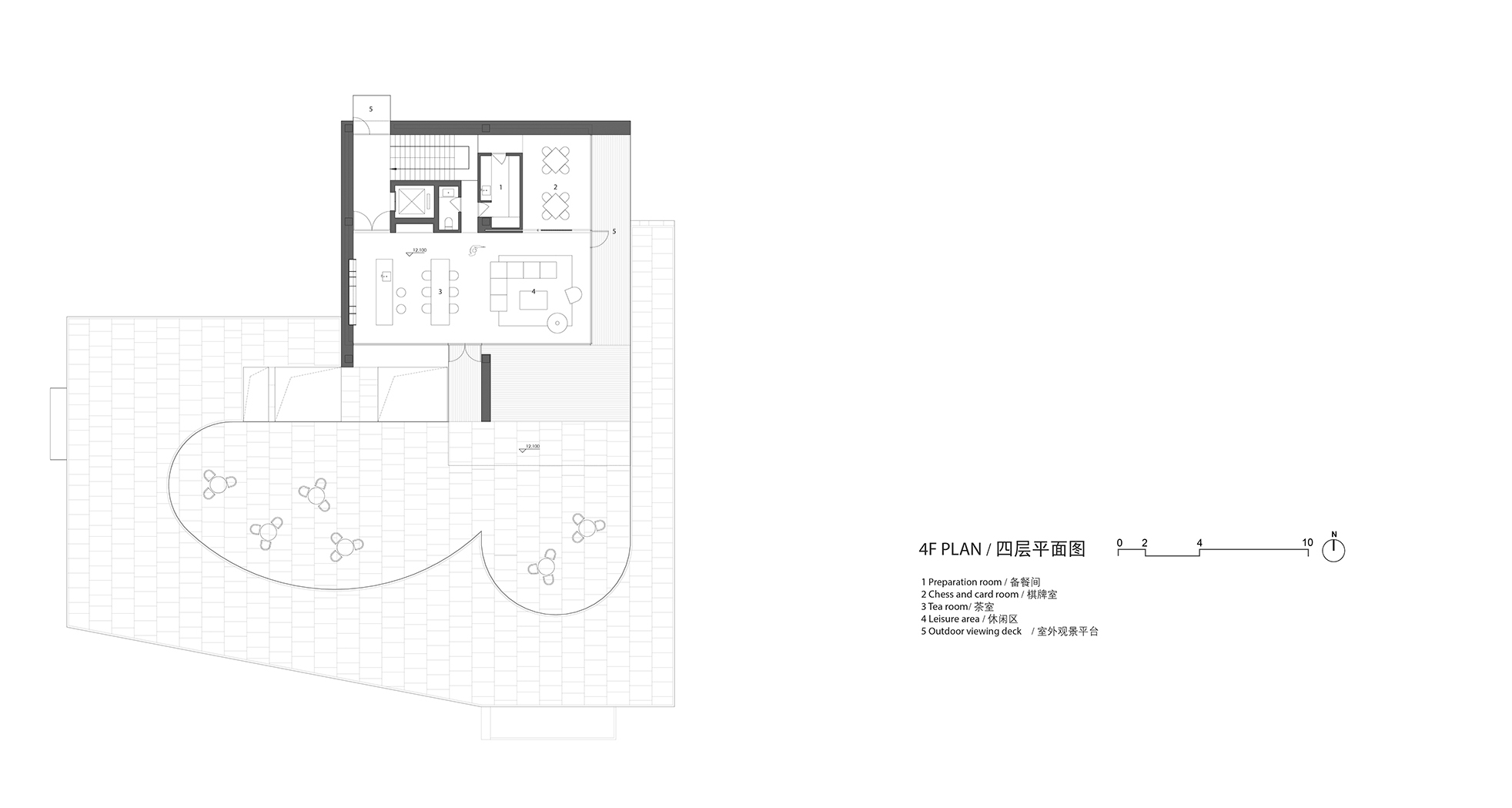
设计单位 TAOA陶磊建筑
项目地点 河北秦皇岛
建成时间 2023年9月
建筑面积 4050平方米
本文文字由设计单位提供。
这是一个旧建筑改造项目,改造后的空间以度假为主要功能。原有的建筑为混凝土框架结构,坐落在北方海边的一片密林深处,周围自然景观独立且安静,几百米的密林之外便是广阔的大海。
This project involves the renovation of an old building into a vacation destination. The original building, featuring a concrete frame, is nestled within a dense coastal forest in northern China, surrounded by a serene and secluded natural landscape. Just a few hundred meters beyond the forest lies the vast sea.

原有建筑沿着刺槐密林边缘线性分布,主体被拉长至百米,南侧和东侧均伴有优质水景。但其室内布局使用单侧走廊,存在大量冗长的过道空间。此外,建筑的立面处理也十分封闭局促,周边低缓延绵的微坡景观被托斯卡纳风情的细密竖条窗切分得支离破碎,得天独厚的原生景观被拒之门外。
Originally, the building stretched 100 meters along the edge of an acacia forest, with beautiful waterscapes on both the south and east sides. However, its interior design included a single-sided corridor, resulting in long and somewhat redundant hallway spaces. The facade was overly closed off, fragmented by narrow Tuscan-style vertical strip windows that obscured the scenic rolling landscape around it, ultimately isolating the building from its natural surroundings.

改造的目标是打破孤立且封闭的建筑立面,在内部建筑空间与优美的外部自然环境之间建立密切的联系,尽可能地将自然引入室内,同时重新组织内部空间的关系,创造一个全新的度假生活方式。
The renovation aimed to break down the isolated and enclosed facade, fostering a close relationship between interior spaces and the picturesque surrounding environment. By reorganizing the interior layout, the design introduces a refreshed vacation lifestyle that brings nature indoors as much as possible.





为了确保空间的灵活性,原始的柱网被视为有秩序的网格,新空间在原始的网格中被重新定义。结构柱或被消隐在隔间墙内,凸显空间的灵活性;或被刻意暴露,强调空间的秩序感。
To enhance spatial flexibility, the existing column grid was treated as an orderly framework. Within this grid, structural columns are either concealed within partition walls or deliberately exposed, creating a new balance of openness and structural coherence.







为了使建筑能和周围建立更充分的联系,改建采用三种策略。
To strengthen the building's connection with the surroundings, three main strategies were employed in the renovation.
一是利用混凝土框架结构的特点,拆除一层原有的填充外墙,统一内部吊顶高度并将其向四周延伸,形成挑出外部的雨棚,建立了一条横贯整个建筑的水平线。
First, based on the existing concrete frame structure, the design team removed the first floor's outer infill walls, unified the interior ceiling height, and extended the ceiling outward to create a cantilevered canopy.
在这条抽象的水平线之上,石头外墙塑造了坚固且沉重的体量,更反衬出下部形体的空与透。沿着长长的挑檐看出去,远处松散的自然和周围环绕的景观成为一条微缩的景观带,被收集组合起来。
The canopy establishes a horizontal line across the entire building, contrasting the solid stone walls above with the airy, transparent lower section. Above this line, a solid stone facade emphasizes the structure's volume, while the space below opens to the landscape with enhanced transparency. The transparent glazing facade beneath the protruding eaves becomes an abstracted landscape belt, which captures the surrounding environment. Viewed from under the extended overhanging eaves, the distant, scattered natural landscape takes on an ordered abstraction, forming a cohesive view of the surrounding wilderness.






二来为了更好地与自然融合,改造中减去原始建筑中局部使用面积,使其成为内院,将自然由外部引向室内。
The second strategy involved creating an inner courtyard by selectively reducing interior floor area, to enhance engagement with nature.


三是设计院墙,它们使建筑原本松散的形态被联系为一个整体,同时将外部自然包裹进建筑内部,模糊了建筑边界。
Lastly, the third strategy introduced new courtyard walls, linking previously scattered sections of the building and wrapping external nature into the interior. In this way, the building’s boundary is deliberately blurred, allowing for a seamless integration with the surroundings.


建筑上部顺应原始建筑体型特性,分为两个独立的部分。一部分是公共的客房区,另一部分则是相对私密的居所,中间隔着一个露天羽毛球场。
The upper portion of the building follows the original layout, divided into two distinct areas: a communal area, and a more private guestroom area, with an open-air badminton court positioned in between.
建筑屋顶在这样的环境中是可贵的,它提供了多样的景观视角和空间体验。
The rooftop adds significant value, offering diverse vantage points and spatial experiences.

改造方案在建筑中段设计了醒目的室外楼梯和坡道。这不仅是出于消防疏散的需要,更重要的作用是,它在二层以上的空间和地面之间建立了联系,使用者可以在日常上下交通的过程中移步换景,游走于自然之中。
A striking outdoor staircase and ramp in the middle section serve not only for fire evacuation but also connects the upper floors directly to the ground, allowing for varying views as one moves up and down, encouraging immersion in nature.



建筑外墙用米黄色石材建造而成。米黄色更容易让人在北方寒冷的冬季中联想到一丝暖意,这样的选择同时也是业主的美好期待。建筑以坚实的外墙与厚重的体量反映着北方人和这片土地的共同性格。
The exterior is finished with beige stone, conveying warmth during cold northern winters and aligning with the owner's vision. The solid walls also resonate with the region's character.


设计团队在设计中结合建筑原有轮廓,将形体塑造得更具雕塑感。在这片充满野性的密林中,石质建筑格外安静且具有力量。
By retained the building's original contours, the design team transformed it into a stone sculpture that exudes tranquility and strength amidst the wild forest.


设计过程,即是理想化的愿景与现实之间对峙的过程。在这种抗争过程中,设计团队不再被简单的内在决定论或是外在形式论所限制,而是通过引入自然,使建筑摆脱过去贫瘠的功能主义。
The design process was a balance between idealistic vision and practical constraints, avoiding simplistic determinism or superficial formalism. Through nature’s intervention, the design team sought to liberate the building from its previous rigid functionalism.


改造一个旧建筑也是改造一个局部旧世界,需要将内部的结构进行保留并重新组织,使其更有内在的逻辑。多重维度的逻辑叠加,使建筑形成丰富的多样性以及鲜明的个性。
Renovating this old building signifies a transformation of an outdated environment. By preserving and reorganizing its internal structure, the design team enhanced its inherent logic. This layering of new logic fosters a rich and distinct architectural character.
我们希望原有建筑通过改造,能为使用者带来全新的建筑体验,彻底改变其封闭且刻板的印象;希望它在开放的同时,仍可以保有北方建筑的厚重感与力量感,与北方的地域特点、性格特征相一致;最后希望它融于自然、归于自然、成为自然。
We hope opening the building to nature while retaining the solidity and strength characteristic of northern architecture. Ultimately, the building harmonizes with its regional context, blending into the natural landscape and becoming one with it.



设计图纸 ▽








完整项目信息
项目名称:如是海·尚空间
项目类型:度假康养空间
项目地点:秦皇岛如是海
设计单位:TAOA陶磊建筑
事务所网站:www.i-taoa.com
主创建筑师:陶磊
设计团队完整名单:陶磊、陈真、孟祥瑞、陶冶、崔翔、张梦莹、何晓甜、高文卓、刘红(实习)
项目业主:宏兴集团
完工时间:2023年9月
建筑面积:4050平方米
甲方团队:宏兴文旅
施工图设计:TAOA陶磊建筑
室内设计:TAOA陶磊建筑、CCD
景观设计:TAOA陶磊建筑
照明顾问:Lucent空间艺术中心(深圳),赵宁
项目摄影:陶磊
材料品牌:温莎米黄石材、大庄户外竹地板、能亮手工砖
版权声明:本文由TAOA陶磊建筑授权发布。欢迎转发,禁止以有方编辑版本转载。
投稿邮箱:media@archiposition.com
转载请注明来源本文地址:https://www.tuituisoft/blog/26918.html